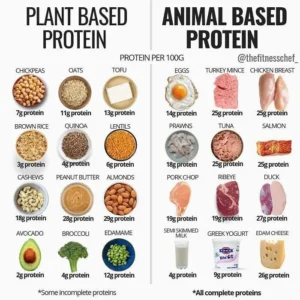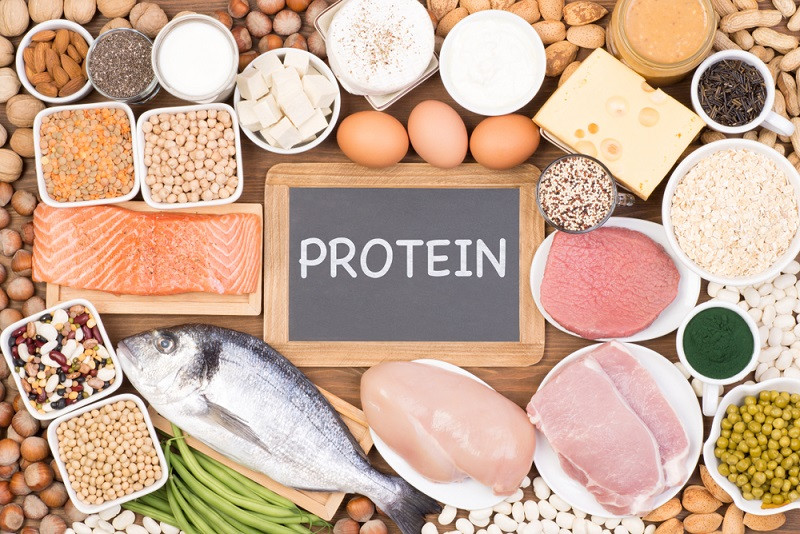Protein is possibly the most important macro nutrition for health and the maintenance of muscle mass. It has traditionally been a main talking point for gym goers but has been well researched over the past decades and we now understand how important protein is for every body. Through years of scientific research, we can confidently say, we now understand more about protein than ever before.
What is protein?
Protein is one of the three macronutrients, alongside carbohydrate and fat. Each macro nutrient has it’s role to play in the body and serves to provide it’s own unique benefits. Most importantly, we need all three, but not in the same amounts.
Protein is made up of amino acids. These are the building blocks of protein and tissues in our bodies. Our entire body is made up of amino acids chained together to make protein.
There are two types of amino acids:
- Essential amino acids
Our bodies do not produce these, we have to consume essential amino acids through foods or supplements. - Non-essential amino acids
Our bodies produce these, therefore it’s less important we consume these.
The non-essential amino acids, despite the name, are usually the most important. Our bodies have a way to make the amino acids that are most necessary for function over the ones we must consume as a mechanism of survival. However, it’s usually the case is that our bodies make enough for baseline function, not for optimal function.
Signs of protein deficiency
If you are eating too little protein you might be experiencing the following:
- Fatigue
- Muscle wasting
- Muscle pain & fatigue after exercise
- Lack of muscle tone or development
- Brain fog and lowered cognitive function
- Sugar cravings
- Constant hunger
- Weak skin, hair and nails
- Slow wound healing
- Impaired immunity
- Vulnerable to bone fractures
- Headache
- Nausea
How much protein should I eat?
The RDI (recommended daily intake) in New Zealand for men between 19-70 years is 64 grams and for women between 19-70 it is 46 grams. That’s roughly around 0.8 grams per kilo of body weight. This is the bare minimum for just living. The number you want to be aiming for is around 1.8g of protein per kilo of body weight per day for optimal health and recovery. So for an 80kg individual that will equate to 144g.
To find out how much protein you’re consuming we suggest doing a 3-day food diary and putting the data into My Fitness Pal or something similar. This will give you a rough estimate of your protein consumption. You may be shocked by how much you are actually consuming but this will give you instant information as to whether you need more or less protein in your daily intake.
Can I overdo protein?
Yes, like absolutely anything in nutrition, there is a threshold however it is a very large amount of protein. For protein, the issue is that excess protein will cause extra stress on your kidneys because they are responsible for excretion of waste products, mainly nitrogen coming from excess protein in the body.
However, this only becomes a factor if you are consuming around 3-4 kg of protein per kilo of body weight – which is a massive amount of protein! That’s kilograms not grams.
Exercise and protein
If you are very active and engage with daily exercise, especially heavy weight training or endurance activities, your need for protein will increase.
But it isn’t the case that if you are not active, that your need for protein reduces. This is a really common misconception.
Muscle function, tone and recovery is a big part of protein’s role, but it isn’t the whole role – it only scratches the surface in fact! Protein plays a role in every single process and cell in your body. Therefore, eating protein will affect your overall health greatly whether you’re active or not.
Protein Sources
The thing to consider with protein sources is that not all are equal. Animal and plant based protein sources have different structures. We must consider the bioavailability and amino acid profile of these protein sources – meaning how well our bodies digest and utilise these proteins.
Animal sources of protein are far superior in terms of bioavailability compared to plant based sources. However, plant protein powders have come along way and these does are generally blended together to make complete protein sources. Scorpion Vegan protein is a blend of brown rice and pea protein. This blend makes the protein a complete protein source, which is far more beneficial then pea protein on it’s own.
If you are not restricted by a vegetarian or vegan diet then we recommend getting the majority of your protein from animal sources (including Scorpion Whey Protein) and include plant based protein only as variety.
If you are vegan or vegetarian, we recommend doing a deep dive on your protein sources and make sure you are consuming enough on a daily basis.

When to consume protein
Protein timing has always been a hotly debated topic. Traditionally it was thought that you should ingest a large percentage of your protein post exercise. The was known as the window of opportunity. In the past decade or more this theory has been debunked and modern science is clear that what matters most is that you are ingesting the right amount of protein each day. So firstly, identify how much you need then simply divide your protein requirements by the number of meals that you are consuming. For a individual aiming for 160g of protein per day, who is eating four meals, this will quite simply be 40g per meal. Nice and easy. This can include a serving at breakfast, lunch, post training and dinner, as an example.
Also it is important to note that it is best to consume your protein in larger portions, rather than drip feeding. Four meals of 40g of protein will support recovery better that 8 meals of 20g. So make sure your protein meals are of a decent proportion to help spike protein synthesis which will support your muscle repair and health more effectively.
If you are looking for additional protein in your daily nutrition, try Scorpion’s Whey or Vegan protein’s today:
Scorpion Whey Protein
https://scorpionsupplements.co.nz/supplement-category/whey-protein/
Scorpion Vegan Protein
https://scorpionsupplements.co.nz/supplement-category/vege-protein/


